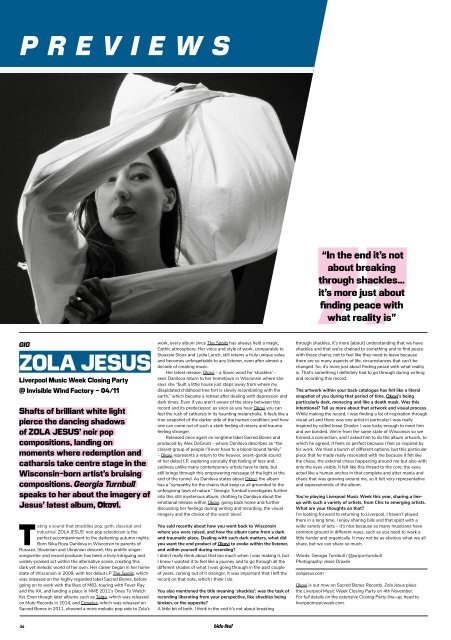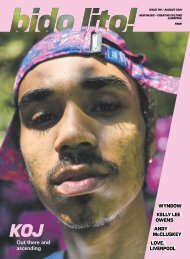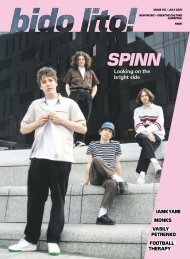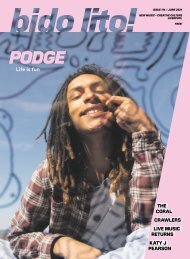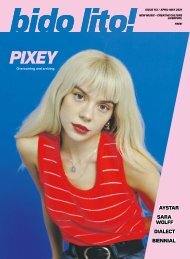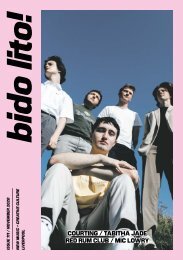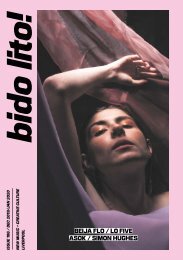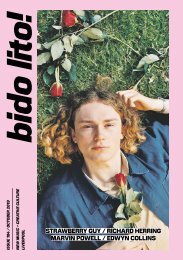Issue 83 / November 2017
November 2017 issue of Bido Lito! magazine. Featuring: SILENT BILL, SECRET SOCIETY OF SUPERVILLIAN ARTISTS, XAMVOLO, REMÉE, MERSEYRAIL SOUND STATION, HOWIE PAYNE, LOYLE CARNER, LIVERPOOL PSYCH FEST, ZOLA JESUS and much more.
November 2017 issue of Bido Lito! magazine. Featuring: SILENT BILL, SECRET SOCIETY OF SUPERVILLIAN ARTISTS, XAMVOLO, REMÉE, MERSEYRAIL SOUND STATION, HOWIE PAYNE, LOYLE CARNER, LIVERPOOL PSYCH FEST, ZOLA JESUS and much more.
You also want an ePaper? Increase the reach of your titles
YUMPU automatically turns print PDFs into web optimized ePapers that Google loves.
PREVIEWS<br />
“In the end it’s not<br />
about breaking<br />
through shackles…<br />
it’s more just about<br />
finding peace with<br />
what reality is”<br />
GIG<br />
ZOLA JESUS<br />
Liverpool Music Week Closing Party<br />
@ Invisible Wind Factory – 04/11<br />
Shafts of brilliant white light<br />
pierce the dancing shadows<br />
of ZOLA JESUS’ noir pop<br />
compositions, landing on<br />
moments where redemption and<br />
catharsis take centre stage in the<br />
Wisconsin-born artist’s bruising<br />
compositions. Georgia Turnbull<br />
speaks to her about the imagery of<br />
Jesus’ latest album, Okovi.<br />
Toting a sound that straddles pop, goth, classical and<br />
industrial, ZOLA JESUS’ noir pop eclecticism is the<br />
perfect accompaniment to the darkening autumn nights.<br />
Born Nika Roza Danilova in Wisconsin to parents of<br />
Russian, Slovenian and Ukrainian descent, this prolific singersongwriter<br />
and record producer has been a truly intriguing and<br />
widely-praised act within the alternative scene, creating this<br />
dark yet melodic world of her own. Her career began in her home<br />
state of Wisconsin in 2009, with her debut LP The Spoils, which<br />
was released on the highly regarded label Sacred Bones, before<br />
going on to work with the likes of M<strong>83</strong>, touring with Fever Ray<br />
and the XX, and landing a place in NME 2011’s Ones To Watch<br />
list. Even though later albums such as Taiga, which was released<br />
on Mute Records in 2014, and Conatus, which was released on<br />
Sacred Bones in 2011, showed a more melodic pop side to Zola’s<br />
work, every album since The Spoils has always held a magic,<br />
Gothic atmosphere. Her voice and style of work, comparable to<br />
Siouxsie Sioux and Lydia Lunch, still retains a truly unique value<br />
and becomes unforgettable to any listener, even after almost a<br />
decade of creating music.<br />
Her latest release, Okovi – a Slavic word for ‘shackles’ –<br />
sees Danilova return to her hometown in Wisconsin where she<br />
says she “built a little house just steps away from where my<br />
dilapidated childhood tree fort is slowly recombining with the<br />
earth,” which became a retreat after dealing with depression and<br />
dark times. Even if you aren’t aware of the story between this<br />
record and its predecessor, as soon as you hear Okovi you can<br />
feel the rush of catharsis in its haunting melancholia. It feels like a<br />
true snapshot of the darker side of the human condition; and how<br />
one can come out of such a stark feeling of misery and trauma<br />
feeling stronger.<br />
Released once again on longtime label Sacred Bones and<br />
produced by Alex DeGroot – whom Danilova describes as “the<br />
closest group of people I’ll ever have to a blood-bound family”<br />
– Okovi represents a return to the heavier, avant-garde sound<br />
of her debut LP, exploring sonically that feeling of loss and<br />
sadness unlike many contemporary artists have to date, but<br />
still brings through this empowering message of the light at the<br />
end of the tunnel. As Danilova states about Okovi, the album<br />
has a “sympathy for the chains that keep us all grounded to the<br />
unforgiving laws of nature.” Georgia Turnbull investigates further<br />
into this still mysterious album, chatting to Danilova about the<br />
emotional release within Okovi, going back home and further<br />
discussing her feelings during writing and recording, the visual<br />
imagery and the choice of the word ‘okovi’.<br />
You said recently about how you went back to Wisconsin<br />
where you were raised, and how the album came from a dark<br />
and traumatic place. Dealing with such dark matters, what did<br />
you want the end product of Okovi to evoke within the listener,<br />
and within yourself during recording?<br />
I didn’t really think about that too much when I was making it, but<br />
I knew I wanted it to feel like a journey and to go through all the<br />
different shades of what I was going through in the past couple<br />
of years, coming out of it stronger. It was important that I left the<br />
record on that note, which I think I do.<br />
You also mentioned the title meaning ‘shackles’: was the task of<br />
recording liberating from your perspective, like shackles being<br />
broken, or the opposite?<br />
A little bit of both. I think in the end it’s not about breaking<br />
through shackles, it’s more [about] understanding that we have<br />
shackles and that we’re chained to something and to find peace<br />
with those chains, not to feel like they need to leave because<br />
there are so many aspects of life, circumstances that can’t be<br />
changed. So, it’s more just about finding peace with what reality<br />
is. That’s something I definitely had to go through during writing<br />
and recording this record.<br />
The artwork within your back catalogue has felt like a literal<br />
snapshot of you during that period of time, Okovi’s being<br />
particularly dark, menacing and like a death mask. Was this<br />
intentional? Tell us more about that artwork and visual process<br />
While making the record, I was finding a lot of inspiration through<br />
visual art and there was one artist in particular I was really<br />
inspired by called Jesse Draxler. I was lucky enough to meet him<br />
and we bonded. We’re from the same state of Wisconsin so we<br />
formed a connection, and I asked him to do the album artwork, to<br />
which he agreed. It feels so perfect because I feel so inspired by<br />
his work. We tried a bunch of different options, but this particular<br />
piece that he made really resonated with me because it felt like<br />
the chaos, the external chaos happening around me but also with<br />
only the eyes visible. It felt like this thread to the core; the eyes<br />
acted like a human anchor in that complete and utter mania and<br />
chaos that was growing around me, so it felt very representative<br />
and expressionistic of the album.<br />
You’re playing Liverpool Music Week this year, sharing a lineup<br />
with such a variety of artists, from Chic to emerging artists.<br />
What are your thoughts on that?<br />
I’m looking forward to returning to Liverpool, I haven’t played<br />
there in a long time. I enjoy sharing bills and that spirit with a<br />
wide variety of acts – it’s nice because so many musicians have<br />
common ground in different ways, such as you need to work a<br />
little harder and organically. It may not be as obvious what we all<br />
share, but we can share so much.<br />
Words: Georgia Turnbull / @jurrjurrturnbull<br />
Photography: Jesse Draxler<br />
zolajesus.com<br />
Okovi is out now on Sacred Bones Records. Zola Jesus plays<br />
the Liverpool Music Week Closing Party on 4th <strong>November</strong>.<br />
For full details on the extensive Closing Party line-up, head to<br />
liverpoomusicweek.com.<br />
34


